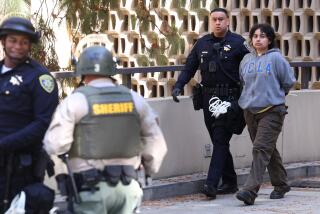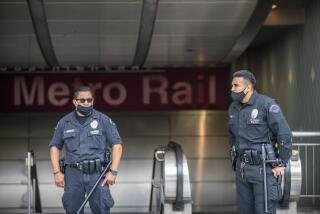Train tickets that don’t take you very far
RENO, NEV — . -- Gabe Kennedy hadn’t heard of the railroad police when a special agent for Union Pacific wrote him a $190 ticket for trespassing on a bridge that university students routinely use as a shortcut to campus.
Neither had Jason Ormsby, a graduate chemistry student at the University of Nevada, Reno, or Katie Carr, who is studying there to be a teacher.
“I cried,” said Carr, 22, who lives in neighboring Sparks, nicknamed the “Rail City” because of its birth along the tracks at the turn of the 20th century.
“I’ve never even had a speeding ticket and I get a walking ticket,” she said. “I asked if he would give me a warning and he told me, ‘Police don’t give warnings. The signs are the warnings.’ ”
One of the last vestiges of the Old West, railroad police have been guarding the tracks since the mid-1800s when the likes of Jesse James, Butch Cassidy and the Sundance Kid roamed the region.
Unfamiliar to most, the police are railroad employees who have jurisdiction under state and federal laws to make arrests and carry firearms.
Pennsylvania was the first state to authorize its governor to appoint railroad police officers, in 1865, four years before the transcontinental railroad was completed. Before that, several railroads hired the famed private detective agency of Allan Pinkerton, who uncovered a conspiracy in 1861 to sabotage the track between Baltimore and Wilmington, Del., as part of an assassinate attempt against President Lincoln.
Nevada didn’t formally authorize railroad police until 1921 in a law that remains largely unchanged, said Guy Rocha, the state’s archivist.
“In the very early period they were protecting the interests of the railroads, whether it was the instance of the assassination attempt out East or breaking unions,” Rocha said. “Most of the time it is keeping people off their property” -- mostly the homeless.
Last month, Union Pacific’s police turned their focus to Reno college students, issuing $190 citations to nearly two dozen during a four-hour special enforcement operation as they crossed the railroad bridge over U.S. Interstate 80 on the north edge of the downtown casino district.
Dale Bray, Union Pacific’s director of public safety, said the railroad had conducted 208 such special operations nationwide this year and removed 5,600 people from railroad property and issued 122 trespass citations.
Several Reno students said as many as 100 people were cited, but Bray said the agents told him the total was 23. A number of people were stopped before they walked onto the bridge and therefore were not cited, he said.
“These operations are not to punish people, it is to enforce laws that are there to protect them,” said Bray, who noted that students could use nearby pedestrian bridges.
“One of them was wearing headphones and another was reading the newspaper as they walked across the narrow bridge,” he said.
Many of those caught grudgingly paid their tickets. But about a dozen who said they were being “railroaded” showed up in Reno Justice Court to challenge the fines.
“I was just trying to make it to class on time so I cut across the railroad bridge,” one student quietly explained to the judge.
Ormsby said he and his friend were about two-thirds of the way across the bridge when the officer approached them.
“He told us in a rather aggressive way how dangerous it was to cross the bridge, but if he really was concerned about that he could have been on the other side of the bridge warning us away instead of issuing us a citation,” Ormsby said.
“I thought we were just going to get a warning. The whole thing seemed pretty ridiculous,” he said.
Justice of the Peace Jenny Hubach agreed.
“It’s sort of silly that they charged you. I’m going to dismiss it,” she told one defendant before dismissing the cases against each of the accused railway trespassers. “They must have had a slow day.”
Railroad officials said the matter was anything but silly.
“We take safety very seriously here,” said James Barnes, a regional spokesman for Union Pacific, headquartered in Omaha, Neb.
Last year, 517 people died while trespassing on railroad property in the United States. From January through Aug. 1 of this year, there have been more than 26,000 instances of trespassing on Union Pacific property, Bray said.
Richard Gent, regional director of Operation Lifesaver, a nonprofit group that Union Pacific helped start years ago to educate the public about railroad safety, said the Reno train bridge in question had been a popular shortcut for years.
“It is a challenge there,” he said from Fallon. “There are other places you can cross nearby where there are sidewalks.”
Gent said the tickets were warranted because a train moving at 55 mph takes more than a mile to stop and if someone was on the bridge, they’d have nowhere to go.
“It’s a difficult lesson to learn but you’ve got to start somewhere. The next lesson is someone gets killed out there and everybody says, ‘What happened?’ ”
Bray said there was nothing excessive about the $190 fines.
“How much money do you want to put on someone’s life?” Bray asked.
Union Pacific has stepped up its enforcement of trespassing generally since the Sept. 11 terrorist attacks, he said, “but in this particular case, I don’t think 9/11 or homeland security issues played a part in the special operation on this bridge.”
“It is completely about the safety of the students who go to that university,” he said.
Ormsby and other students said a better way to handle the safety concerns would be to issue warnings and educate people about the danger. He said that until very recently, the “No Trespassing” signs had been defaced and were illegible.
“I feel so bad because so many people didn’t go to court and they just paid the fine,” he said.
More to Read
Sign up for Essential California
The most important California stories and recommendations in your inbox every morning.
You may occasionally receive promotional content from the Los Angeles Times.









